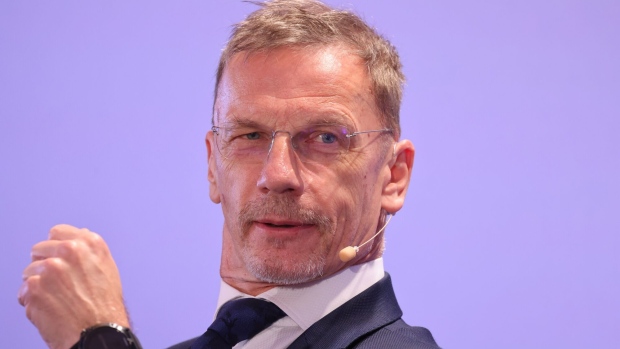May 29, 2024
ECB’s Vujcic Faces Uncertain Future With New Term in the Balance
, Bloomberg News

(Bloomberg) -- Croatia’s new government is throwing the future of the country’s central bank chief into question at a critical juncture for euro-zone interest rates.
The administration, which took power this month, has until July 13 to decide whether to hand the 59-year-old Boris Vujcic a third six-year stint as governor. But with the addition of a nationalist party to Prime Minister Andrej Plenkovic’s ruling coalition complicating appointments, Vujcic’s prospects are unclear.
Any personnel shakeup would come with the European Central Bank’s Governing Council — which sets monetary policy for the euro zone and counts Vujcic as a member — on the brink of cutting rates following an unprecedented inflation-fighting campaign.
Replacing him could also damage Croatia’s hopes of gaining a louder voice within the European Union, which it only joined in 2013, since Vujcic is considered a possible candidate for elevation to the ECB’s six-strong Executive Board down the line.
Having helped steer the former Yugoslav republic of 3.9 million people into the currency bloc in 2023, Vujcic had looked a safe bet to continue. But Plenkovic must hammer out a deal over who leads the central bank with the anti-immigration Homeland Movement that he teamed up with after elections in April left his conservative Croatian Democratic Union short of a majority.
While he’s made broad pledges of continuity for Croatia, there are already signs that cohabitation with Homeland — which opposed euro adoption at the time — may prove tricky. The party is already attempting to block the appointment of a Serb minority leader to chair parliament’s human-rights committee.
The central-bank governor must be approved by lawmakers following a proposal by parliament’s committee for appointments and administrative affairs, with endorsement by the finances and budget committee. The mandates of Vujcic’s deputy, Sandra Svaljek, and two vice governors also end in July. Decisions at the monetary authority are taken by an eight-member council.
A government spokesman didn’t respond to written questions from Bloomberg on the situation at the central bank, as did the incumbent himself.
Vujcic arrived at the ECB amid one of the continent’s most turbulent periods, establishing a reputation as a hawk as he and his colleagues sought to tame the price spike that followed Russia’s invasion of Ukraine.
With a vacancy on the ECB’s Executive Board unlikely before 2026, Vujcic may fall out of the running should he not retain his job. The panel has never had representation from an eastern euro-area country, of which there are six.
“Not re-nominating Vujcic would mean wasting an opportunity for Croatia and the eastern EU countries,” said Gunter Deuber, chief economist at Raiffeisen Bank International in Vienna. “He has a solid reputation even in hawkish monetary policy circles, while he’s always shown an understanding for policy doves. In this respect, he’s accepted by the Governing Council and isn’t regarded as a dogmatist.”
Croatia isn’t the only country whose central-bank chief is nearing the end of their term. Cyprus’s governor was already replaced this year, while Spain and Austria are also set to name successors to Pablo Hernandez de Cos and Robert Holzmann.
--With assistance from Alexander Weber.
©2024 Bloomberg L.P.







